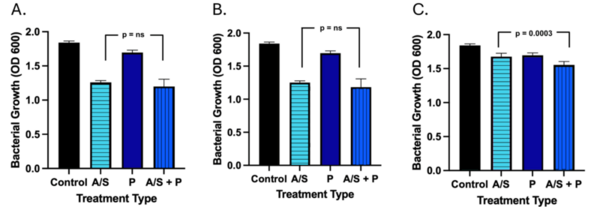The effect of bioenhancers on ampicillin-sulbactam as a treatment against A. baumannii
(1) Ames High School, (2) Department of Veterinary Microbiology and Preventive Medicine, Iowa State University
https://doi.org/10.59720/23-215
As more bacteria develop antibiotic resistance, bioenhancers – substances that enhance antibiotic performance – are emerging as potential solutions. However, the effectiveness of bioenhancers has not been measured on highly antibiotic-resistant pathogens. We hypothesized that the bioenhancer piperine, derived from black pepper, combined with the drug ampicillin-sulbactam, would lead to decreased growth of Acinetobacter baumannii, a highly resistant bacterium, compared to the drug alone. Broth dilution was used to find the minimum concentration of drug needed to inhibit three strains of A. baumannii, with Escherichia coli as a control, providing a baseline for the strain’s resistance levels. The strains were exposed to four treatments: varying concentrations of ampicillin-sulbactam alone, piperine alone, a combination of ampicillin-sulbactam and piperine, and no treatment to analyze the antibiotic-bioenhancer synergy. Treatments were also incubated with macrophages, cells of the mammalian innate immune response, measure drug efficacy under conditions mimicking early stages of infection. The results indicated that combining piperine with ampicillin-sulbactam at 64 mg/L and 32 mg/L reduced bacterial growth for two A. baumannii strains compared to treatment with antibiotic alone. However, the third strain had no significant difference in bacterial growth. However, at a drug concentration of 16 mg/L, the addition of piperine led to significantly reduced bacterial growth for all three strains (p < 0.001, p < 0.0001, p < 0.0001). These studies showed that piperine enhanced ampicillin-sulbactam efficacy against A. baumannii. The addition of piperine led to lower minimum inhibitory concentrations of the antibiotic against drug-resistant A. baumannii.
This article has been tagged with: